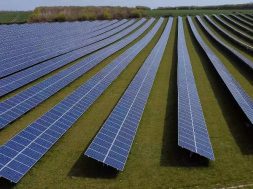
REC Silicon sees hope for resolving China solar dispute under Trump
A three-year-old trade row with Beijing over polysilicon used in solar panels could be resolved soon as the Trump administration looks to reduce the U.S. trade deficit with China, the chief executive of REC Silicon (REC.OL) said on Wednesday.
China imposed tariffs on, and later banned, imports of solar-grade U.S. polysilicon in 2014, shutting U.S. producers out of a market that accounts for 80 percent of global demand.
A lobbying effort is currently under way in Washington to ensure polysilicon is included on a list of goods being drawn up to help the United States reduce its trade deficit with China, REC Silicon CEO Tore Torvund said during an earnings presentation.
“We have an ongoing conversation with the new administration and we are in agreement. They have expressed a clear interest in finding a resolution to this,” said the CEO, who was in Washington last week to talk with U.S. officials.
“There is definitely a positive momentum right now and if this momentum is realised then something will happen within the next 2-3 months.”
Oslo-listed REC Silicon owns the Moses Lake Polysilicon production plant in the U.S. state of Washington, one of the largest in the world. Output capacity has been reduced by 50 percent as a result of the trade row with China and 70 employees have been laid off.Torvund said chances for resolving the dispute increased significantly after U.S. President Donald Trump and Chinese President Xi Jinping met in Florida last month.
“We were actively trying to get this (dispute) on the agenda at that meeting and what occurred is basically that the two presidents decided to put together a list within the next 2-3 months of means to try to reduce the trade deficit between the U.S. and China,” Torvund said.
“We want to be on that list and have told the administration that if this dispute was to be resolved, we could increase our export to China by $400-$500 million, and it would create hundreds of new jobs in the U.S., because we and the other companies could then restart our operations.”
(Reporting by Joachim Dagenborg; editing by Gwladys Fouche and Jason Neely)












